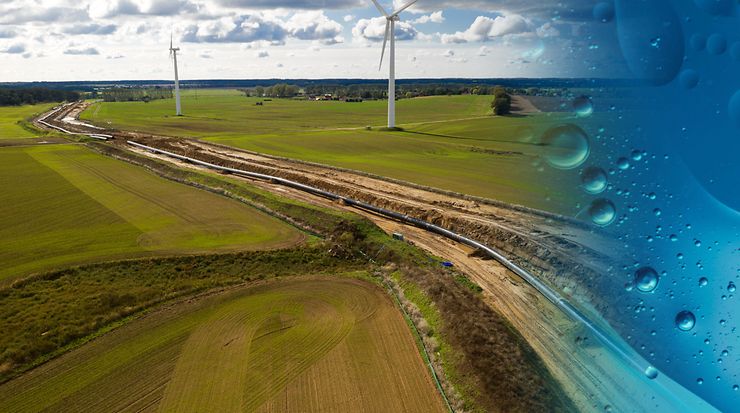Working Committee 2 - Infrastructure

The working committee (WC) "Infrastructure" is responsible for all technical regulations in the field of hydrogen supply infrastructure. In addition to pipeline infrastructure, this also includes storage facilities of all sizes connected to the infrastructure as well as liquefaction and regasification facilities and containers.
WC 2 Infrastructure includes the following SWCs and WGs:
SWC 2.1 - Transportation and Distribution Networks
- WG 2.1.1 - Pipings
- WG 2.1.2 - Transfer lines
- WG 2.1.3 - Plant engineering
- WG 2.1.4 - Distribution networks
SWC 2.2 - Storage
- WG 2.2.1 - Stationary and mobile above-ground storage facilities
- AG 2.2.2 - CCU/CCS
- WF 2.2.3 - Underground gas storage
- WG 2.2.4 - Liquefaction
Working committee 2 – Infrastructure
Tasks of the working group 2.1.1 – Piping
The Piping WG is responsible for identifying standardization needs in the field of industrial piping for plant supply outside the plant boundary and the field of flanges and their connections. Among other things, this includes requirements for pipelines made of metallic materials for hydrogen and hydrogen mixtures, either above ground or laid in ducts or buried in the ground, at different pressure and temperature levels. With the aim of achieving safe operating conditions, requirements for industrial piping systems and their supports made of metallic materials, including safety devices, are of particular importance (e.g. DIN EN 13480 (series) Metallic industrial piping). In this context, industrial piping systems differ from long-distance pipelines. The latter concern pipelines outside industrial plants, e.g. refineries, and are not part of the topics for WG 2.1.1 Piping.
Tasks of the working group 2.1.2 – - Transport networks
The working group is responsible for determining the needs for technical rulemaking in hydrogen transport pipelines (>16 bar) for supplying the public with hydrogen and hydrogen mixtures (according to EnWG).
Tasks of the working group 2.1.3 – Plant engineering
The scope of the Plant Engineering Working Group comprises all plants serving the operation of the pipeline networks, such as compressor plants, gas pressure regulating and metering plants, processing and injection plants, odorizing plants, gas pressure regulating systems in connecting pipelines, etc., including the necessary ancillary plants.
The main subject matter is
- the functional requirements for planning, construction, operation and maintenance of these plants
- requirements for components in hydrogen plants
As well as, as far as possible in standardization,
- qualification requirements for companies for the design, manufacture and operation of hydrogen plants
- qualification requirements for persons for the testing and operation of hydrogen plants - experts and qualified persons
Tasks of the working group 2.1.4 – Distribution networks
The "Distribution Networks" working group actively deals with the topic of hydrogen in gas distribution (≤ 16 bar). Open questions about the hydrogen suitability of materials, components, parts as well as questions about subsequent operation (commissioning, pipe network inspection, repair, etc.) with gases of the 2nd gas family or 5th gas family according to DVGW Code of Practice G 260 are clarified. An important aspect is also to ensure the applicability of the associated standards. Project results will be contributed to this.
Tasks of the working group 2.2.1 – Stationary and portable aboveground storage tanks
This working group is responsible for identifying the standardization needs for stationary and transportable pressure vessels and their equipment regarding design, construction, testing and operation/use for the storage and transport of hydrogen.
Tasks of the working group 2.2.2 – CCU/CCS
The CCU/CCS WG is responsible for identifying the standardization needs in the field of carbon capture, transport, including the necessary transhipment sites and intermediate storage facilities, as well as the requirements for the geological utilization and long-term (permanent) storage of carbon dioxide (Carbon Capture Usage (CCU) / Carbon Capture Storage (CCS)). The subject area of the CCU/CCS WG does not include the processes of these uses of carbon dioxide per se.
Tasks of the working group 2.2.3 – Underground gas storage
This working group is responsible for identifying standardization needs for large-scale storage tanks and their equipment with respect to design, construction, testing, and operation/use for hydrogen storage.
This working group is also responsible for identifying, consolidating and proactively standardizing any research work in this area.
Tasks of the working group 2.2.4 – Liquefaction
The Liquefaction working group deals with technical rules that address liquid hydrogen (cryogenic; LH2), hydrogenations (LOHC), and hydrogen derivatives (e.g., ammonia, methanol,...) in the liquid aggregate state.
Topics covered include: Definitions, generation, compositions of matter, properties of matter, personnel qualifications for handling hydrogen, and requirements for storage and transport media.

